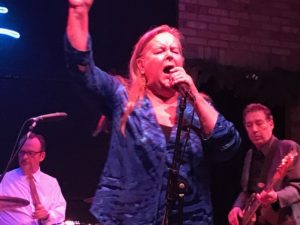

I had wanted to see vocalist Tracy Nelson sing since I was a college freshman and I came close. Having bought tickets to see her perform with Mother Earth in Boston in early 1970 or so, I waited patiently in the theater for her to take the stage. Some time after the appointed hour, Tracy came out to announce that the band’s instruments hadn’t made it from San Francisco. I was incredibly disappointed, as I have had time to recall over the decades since then. Seeing her perform live became a bucket list item for me. I am crazy about her.
I finally got a chance to see Tracy at the Dakota Jazz Club and Restaurant in January 2018. I caught Tracy in mid-flight in the photo at right that I snapped from our table. I wrote about the show at the time and celebrated her career on the occasion of her 78th birthday this past December.
Unlike, say, Taylor Swift, Tracy is not exactly a household name. I was therefore surprised to see Barry Mazor doing in the Wall Street Journal what I was trying to do on Power Line. Mazor looked back fondly on Tracy’s long career in his June 12 review of Tracy’s new recording, Life Don’t Miss Nobody. It’s her first in 10 years. This is Mazor’s introductory look back:
For a singer who has accumulated so many musical friends, Tracy Nelson stands alone.
There’s the longevity: Her first LP, the folk-blues album “Deep Are the Roots,” was released 58 years ago. There’s the versatility, demonstrated consistently across multiple roots-music styles: As an R&B shouter fronting the San Francisco band Mother Earth in the late ’60s, in the tradition of Etta James, she was seen as serious competition for Janis Joplin, with astonishing tracks like “Down So Low,” her original that became a standard, and her thrilling, melancholy-busting take on Boz Scaggs’s “I’ll Be Long Gone.” She immediately turned around and recorded an album in Nashville of the latest country music of the time, backed by much of Elvis Presley’s band; she would be Grammy nominated for a country duet with Willie Nelson in the mid-’70s. She’d later form a terrific and atypical working R&B trio with Marcia Ball and Irma Thomas, and return to outright blues in the quartet the Blues Broads. There have been jazz and gospel and rock ’n’ roll takes as well.
Through all of those turns, the sheer power of her voice, the way she can reach down to the lower end of contralto and belt, has been most remarked on. But more important, Ms. Nelson has brought an extraordinary level of vocal elegance, emotional depth and control to all of those roots sub-genres, even when the fashion was for over-the-top, showy displays.
I want to pluck a few tracks from the new recording for readers who might be interested. Tracy loves American popular music in all its forms — country, blues, soul, rhythm and blues, gospel, rock and roll, the whole shebang. She was Americana before Americana was a thing.
Notes on the new disc are accessible at Tracy’s site here. The title track was written by Tracy with Mike Dysinger. It represents the hard-won wisdom of a soul survivor.
“There Is Always One More Time” is a Doc Pomus number that I only know from the fantastic Doc Pomus tribute album by Johnny Adams (The Real Me). I haven’t heard it in a long, long time. Mickey Raphael joins in on harmonica and Tracy is backed by a chorus with a gospel touch. This is close to a legitimate Sunday morning song. Doc Pomus had a few trials of his own that can be heard in this song (and others such as “Save the Last Dance For Me”).
Sonny Boy Williamson’s “Your Funeral and My Trial” might be my favorite track. I must have led a sheltered life. This was a new one on me. Tracy is joined by New Orleans’s Jontavious Willis. We saw Jontavious at the Dakota when he warmed up for Bobby Rush in January 2022. He is a delightful and talented young man.
On Deep Are the Roots — as Mazor notes, her first album, recorded in 1965 — Tracy included Ma Rainey’s “Trust No Man.” All these years later Tracy returns to Ma Rainey with “Yonder Come the Blues.”
Tracy had a brief moment of national recognition in 1974 with “After the Fire Is Gone,” her duet with Willie Nelson. I thought the world might be catching up with her, but the world moved on. Willie Nelson has not moved on. Willie returns to join Tracy on Hank Williams’s classic “Honky Tonkin.'” That’s Willie’s long-time Family member Mickey Raphael backing on harmonica again.
Marcia Ball and Irma Thomas join Tracy on Chuck Berry’s “Brown Eyed Handsome Man.”
I find myself at risk of going through the entire recording with you, but I want to end on that rousing note.

